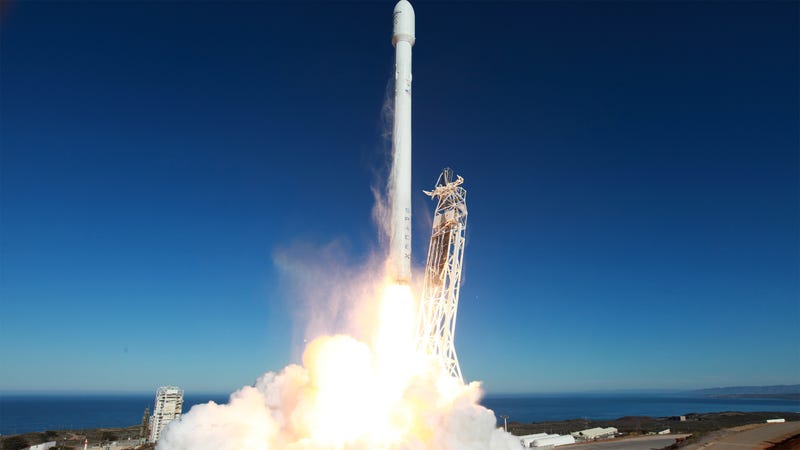Note: this article was published a while ago and was rebloged here and there already. I kept it in my pile of "interesting articles to read later when I'll have time" for a long time as well therefore. But it make sense to post it in conjunction with the previous one about Norman Foster and by extension with the otehr one concerning the Chicago Biennial.
It is also sometimes interesting to read posts with delay, when the hype and buzzwords are gone. Written in the aftermath of the Tesla annoncement about its home battery (Powerwall), the article was all about energy revolution. But since then, what? We're definitely looking forward...
Via Gizmodo
-----
By Annalee Newitz

Photo: SpaceX
Nobody wants to say it outright, but the Apple Watch sucks. So do most smartwatches. Every time I use my beautiful Moto 360, its lack of functionality makes me despair. But the problem isn’t our gadgets. It’s that the future of consumer tech isn’t going to come from information devices. It’s going to come from infrastructure.
That’s why Elon Musk’s announcements of the new Tesla battery line last night were more revolutionary than Apple Watch and more exciting than Microsoft’s admittedly nifty HoloLens. Information tech isn’t dead — it has just matured to the point where all we’ll get are better iterations of the same thing. Better cameras and apps for our phones. VR that actually works. But these are not revolutionary gadgets. They are just realizations of dreams that began in the 1980s, when the information revolution transformed the consumer electronics market.
But now we’re entering the age of infrastructure gadgets. Thanks to devices like Tesla’s household battery, Powerwall, electrical grid technology that was once hidden behind massive barbed wire fences, owned by municipalities and counties, is now seeping slowly into our homes. And this isn’t just about alternative energy like solar. It’s about how we conceive of what technology is. It’s about what kinds of gadgets we’ll be buying for ourselves in 20 years.
It’s about how the kids of tomorrow won’t freak out over terabytes of storage. They’ll freak out over kilowatt-hours.
Beyond transforming our relationship to energy, though, the infrastructure age is about where we expect computers to live. The so-called internet of things is a big part of this. Our computers aren’t living in isolated boxes on our desktops, and they aren’t going to be inside our phones either. The apps in your phone won’t always suck you into virtual worlds, where you can escape to build treehouses and tunnels in Minecraft. Instead, they will control your home, your transit, and even your body.
Once you accept that the thing our ancestors called the information superhighway will actually be controlling cars on real-life highways, you start to appreciate the sea change we’re witnessing. The internet isn’t that thing in there, inside your little glowing box. It’s in your washing machine, kitchen appliances, pet feeder, your internal organs, your car, your streets, the very walls of your house. You use your wearable to interface with the world out there.
It makes perfect sense to me that a company like Tesla could be at the heart of the new infrastructure age. Musk’s focus has always been relentlessly about remolding the physical world, changing the way we power our transit — and, with SpaceX, where future generations might live beyond Earth. The opposite of cyberspace is, well, physical space. And that’s where Tesla is taking us.
But in the infrastructure age, physical space has been irrevocably transformed by cyberspace. Now we use computers to experience the world in ways we never could before computer networks and data analysis, using distributed sensor devices over fault lines to give people early warnings about earthquakes that are rippling beneath the ground — and using satellites like NASA’s SMAP to predict droughts years before they happen.
Of course, there are the inevitable dangers that come with infusing physical space with all the vulnerabilities of cyberspace. People will hack your house; they’ll inject malicious code into delivery drones; stealing your phone might become the same thing as stealing your car. We’ll still be mining unsustainably to support our glorious batteries and photovoltaics and smart dance clubs.
But we will also benefit enormously from personalizing the energy grid, creating a battery-powered hearth for every home. Plus the infrastructure age leads directly into outer space, to tackle big problems of human survival, and diverts our impoverished attention spans from gazing neurotically at the social scene unfolding in tiny glowing rectangles on our wrists.
The information age brought us together, for better or worse. It allowed us to understand our environment and our bodies in ways we never could before. But the infrastructure age is what will prevent us from killing ourselves as we grow up into a truly global civilization. That is far more important, and exciting, than any gold watch could ever be.

